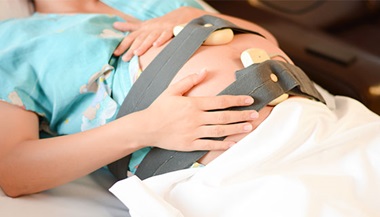What Risks Are Associated with a Ruptured Ovarian Cyst?
Reviewed By:
Having a cyst (a fluid-filled bump) on the ovaries is common and often is without symptoms. Ovarian cysts are typically harmless, says Dana Baras, M.D., M.P.H., an obstetrician/gynecologist at Howard County General Hospital. But in some cases, an ovarian cyst can rupture (break open).
“A ruptured ovarian cyst isn’t automatically a life-threatening condition,” says Baras. “In the majority of cases, the cyst fluid will dissipate and it’ll heal without any intervention. However, there are some instances in which a ruptured ovarian cyst becomes an emergency.”
When might an ovarian cyst need medical attention?
Multiple factors can influence whether a ruptured ovarian cyst becomes problematic. Those include:
Infected Ovarian Cyst
Cysts can develop in response to a pelvic infection (called an abscess). If an infected cyst ruptures, it can trigger sepsis, a life-threatening immune response to harmful bacteria. Women with infected cysts are treated with antibiotics and sometimes require hospitalization for surgical drainage of the cyst.
Women with pelvic inflammatory disease (PID) — an infection of the pelvic area generally resulting from gonorrhea or chlamydia — are more likely to develop infected ovarian cysts. The bacteria from these sexually transmitted diseases travel from the cervix into the uterus and may cause cysts to form. These cysts are filled with bacteria that can lead to sepsis if they rupture.
Ovarian Torsion
Blood flow to the ovary is reduced or cut off when the weight of a cyst causes the ovary to turn over on itself one or more times (called ovarian torsion). If this happens, surgery is necessary to restore blood flow.
Management of a Ruptured Ovarian Cyst

While some ruptured ovarian cysts can cause little to no symptoms, others are more severe. Your healthcare team can help you create a management plan that makes the most sense for you.
Pregnancy and Ovarian Cysts
It’s normal to have an ovarian cyst during your first trimester of pregnancy. This type of cyst, called a corpus luteum, produces hormones that initially help sustain the pregnancy. The cyst usually goes away by the second trimester.
Ectopic pregnancy is when a fertilized egg implants in an area outside of the uterus. Usually this happens in the fallopian tubes, but on rare occasions, it implants on an ovary. Medication or surgery is necessary to remove a cyst caused by ectopic pregnancy — the cyst gets worse as the pregnancy grows in an area that can’t sustain it.
Endometriosis and Ovarian Cysts
Endometriosis is a condition in which tissue that lines the uterus grows outside of it. When endometrial tissue forms on the ovaries, it can produce a type of cyst called an endometrioma. This cyst can fill with blood and grow large. Endometriosis can affect fertility, increase ovarian cancer risk and cause internal bleeding if a cyst ruptures. Cysts caused by endometriosis may require surgery.
How can you tell if an ovarian cyst has burst?
“Not all women feel a ruptured ovarian cyst,” says Baras. “Most do feel pain at the time of rupture and then some discomfort for a few days afterward. Usually, the symptoms can be relieved with over-the-counter medications.”
Symptoms you may experience if you have a ruptured ovarian cyst include:
- Sudden, sharp pain in the lower belly or back
- Vaginal spotting or bleeding
- Abdominal bloating
Seek emergency medical attention if you also have abdominal pain with:
- Severe nausea and vomiting (may indicate ovarian torsion)
- Fever (may indicate infection)
- Heavy vaginal bleeding
- Faintness or dizziness
Treatments for ruptured ovarian cysts include watchful waiting, medications and surgery. “When someone comes in with pain caused by an ovarian cyst, we first assess if it’s pregnancy-related or infected,” says Baras. “An ultrasound helps us evaluate the quality of the cyst and whether it’s ruptured. Treatment depends on the specific diagnosis.”
Sign Up for Our Free Newsletter

One of the best things you can do to protect and improve your health is to stay informed. Your Health is a FREE e-newsletter that serves as your smart, simple connection to the world-class expertise of Johns Hopkins.







